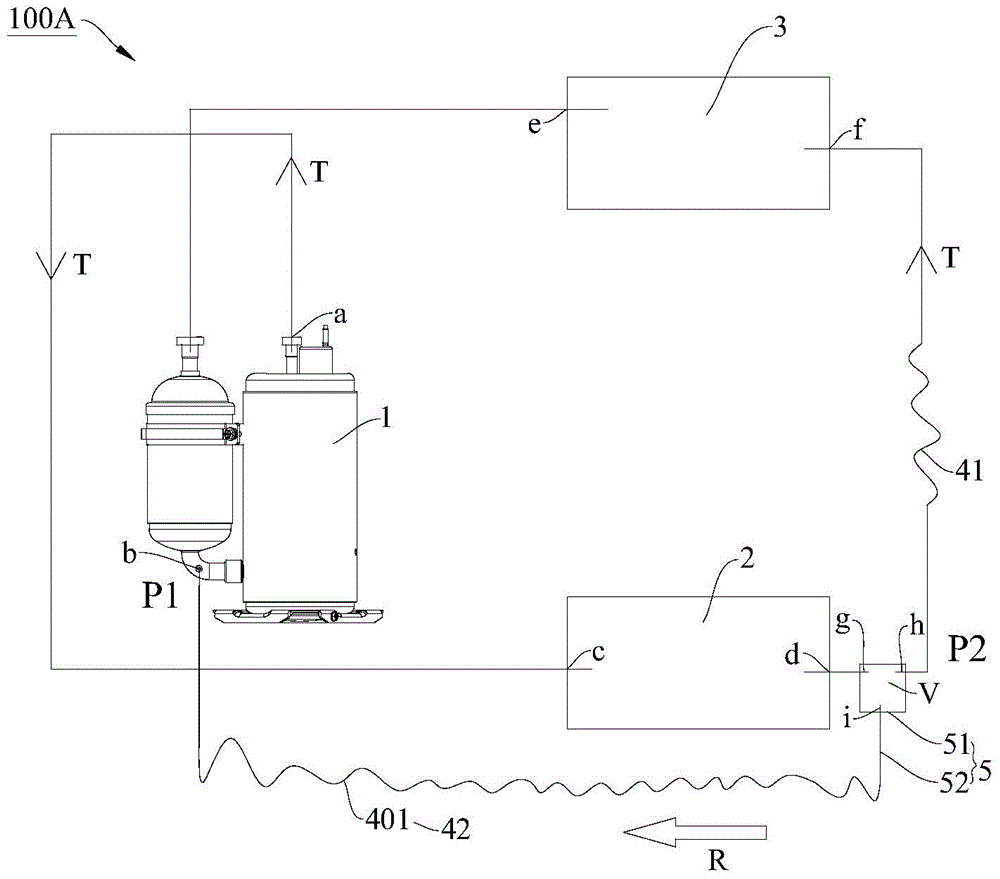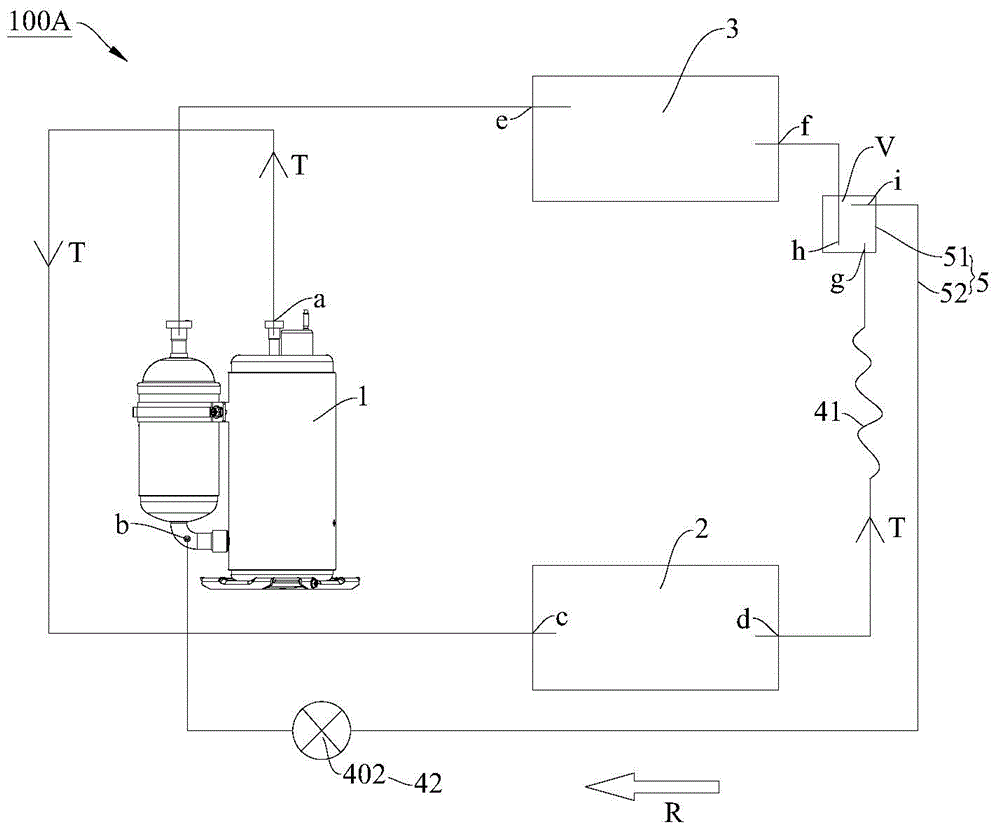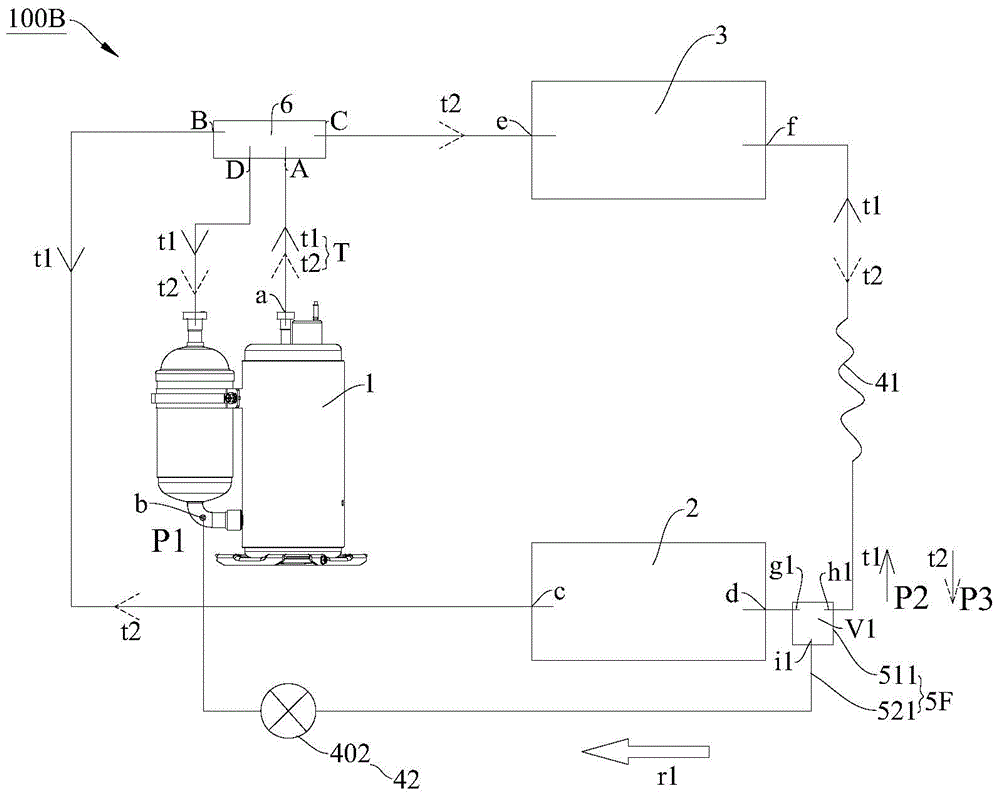Single-cold type refrigeration device and cold-warm type refrigeration device
A refrigeration device, heating and cooling technology, applied in refrigerators, refrigeration components, refrigeration and liquefaction, etc., can solve the problems affecting the heat transfer efficiency of heat exchangers, affecting the performance of compressors, etc., to improve sealing and lubrication performance, and prolong service life Longevity, improved energy efficiency and reliability effects
- Summary
- Abstract
- Description
- Claims
- Application Information
AI Technical Summary
Problems solved by technology
Method used
Image
Examples
no. 1 example
[0062] In this embodiment, as figure 1 As shown, a second throttling element 42 is connected in series between the oil outlet i and the suction port b, that is, the second throttling element 42 is connected in series on the oil return pipe 52, thereby reducing the flow from the oil outlet i to the suction port. The oil pressure at port b will not be too high when the oil reaches the suction port b, so as to prevent the oil from affecting the quality and pressure of the refrigerant entering the compressor 1 from the indoor heat exchanger 3.
[0063] Specifically, in the refrigerant circulation channel T, when the refrigerant flowing out of the refrigerant outlet h flows to the suction port b through the indoor heat exchanger 3, the refrigerant will have a certain pressure loss. Assume that the liquid separation chamber of the oil return device 5 The internal pressure of V is P2, and the pressure at the suction port b of the compressor 1 is P1, then P2>P1. In order to ensure that t...
no. 2 example
[0072] In the second embodiment, such as figure 2 As shown, the structure of the single-cooling refrigeration device 100A is basically the same as the structure of the single-cooling refrigeration device 100A in the first embodiment, and will not be repeated here.
[0073] The difference is that in the second embodiment, the second throttling element 42 is an electronic expansion valve 402. That is, the oil return device 5 performs oil return and pressure drop through the electronic expansion valve 402. Of course, the second throttling element 42 may also adopt other pressure reducing elements, which are not specifically limited here.
[0074] It can be seen from the second embodiment that the arrangement of the inlet g and the refrigerant outlet h is not limited to being connected in series between the outdoor heat exchanger 2 and the first throttle element 41, and the inlet g and the refrigerant outlet h can also be connected in series in the indoor heat exchanger 3 and Between...
no. 3 example
[0093] In this embodiment, as image 3 As shown, a second throttle element 42 is connected in series between the first oil outlet i1 and the suction port b. As a result, the pressure of the oil flowing from the first oil outlet i1 to the suction port b can be reduced, and the pressure will not be too high when the oil reaches the suction port b, thereby preventing the oil from entering the compression from the refrigerant circulation channel T The quality and pressure of the refrigerant inside the machine 1 have an influence.
[0094] In the third embodiment, the first inlet g1 and the first refrigerant outlet h1 are connected in series between the outdoor heat exchanger 2 and the first throttle element 41, that is, between figure 1 In this case, the first liquid distributor 511 is connected in series between the outdoor heat exchanger 2 and the first throttle element 41.
[0095] Advantageously, the second throttle element 42 is configured to adjust the amount of pressure drop of ...
PUM
 Login to View More
Login to View More Abstract
Description
Claims
Application Information
 Login to View More
Login to View More - R&D
- Intellectual Property
- Life Sciences
- Materials
- Tech Scout
- Unparalleled Data Quality
- Higher Quality Content
- 60% Fewer Hallucinations
Browse by: Latest US Patents, China's latest patents, Technical Efficacy Thesaurus, Application Domain, Technology Topic, Popular Technical Reports.
© 2025 PatSnap. All rights reserved.Legal|Privacy policy|Modern Slavery Act Transparency Statement|Sitemap|About US| Contact US: help@patsnap.com



